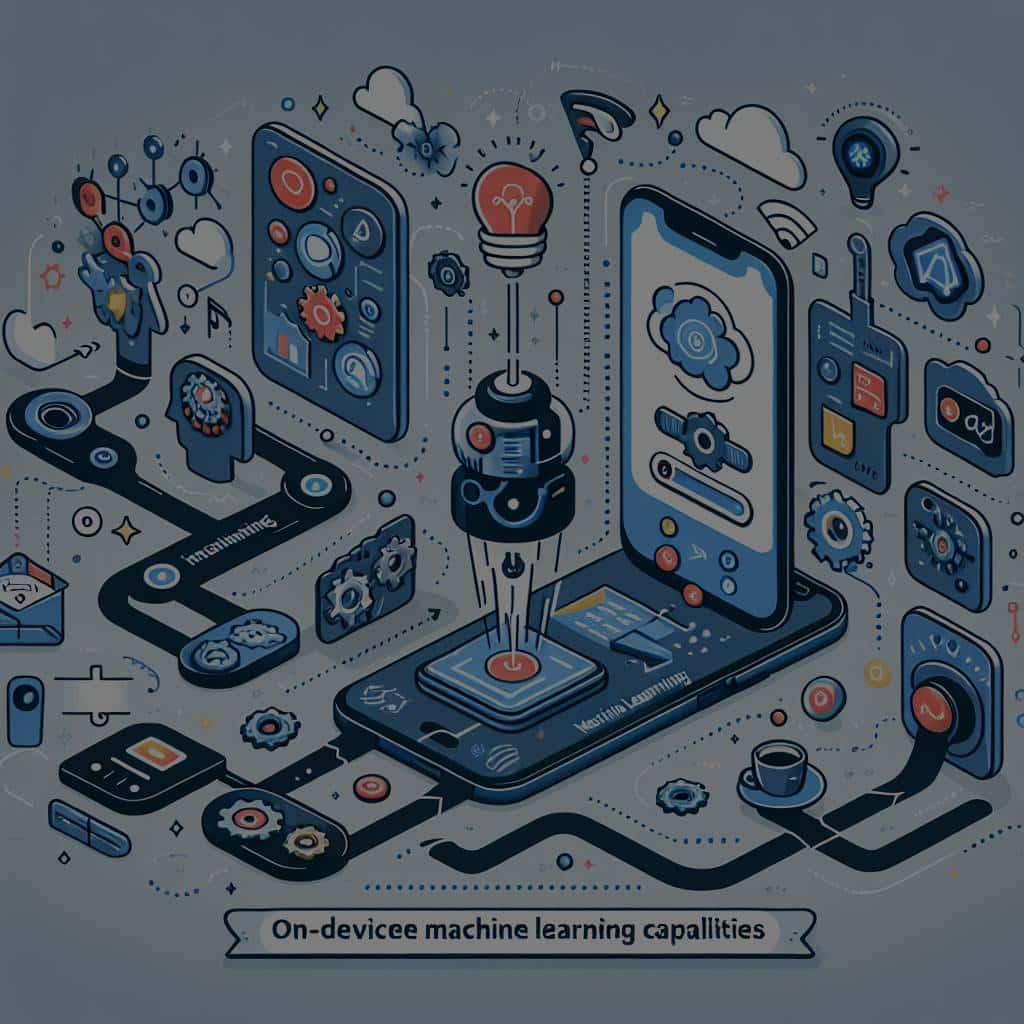How Are On-Device Machine Learning Capabilities Changing Mobile App Experiences?

Mobile apps have significantly evolved over the years, from the simplest of utility programs to sophisticated applications capable of learning from user interactions and personalizing experiences based on learned patterns. This progress can be attributed to the integration of machine learning (ML) capabilities in mobile app development. But what does it mean for the user and the developer? How does it impact the overall mobile app experience? Let’s delve into the world of on-device machine learning and explore its transformative role in mobile applications.
The Intricacies of On-Device Machine Learning
The concept of on-device machine learning might seem complex, but like most technologies, it’s better understood when broken down to its fundamental parts. Essentially, it is the process of running machine learning algorithms directly on a mobile device.
Also read : What Role Can AI Play in Streamlining the Claims Process in Insurance?
Most mobile apps used to rely on cloud-based models for machine learning. These models required a data connection to process information, and the device would transmit data to the cloud for processing, then wait for the results. This method had its downsides, including latency issues, dependence on internet access, and potential data privacy concerns.
On-device machine learning, on the other hand, eliminates the need to send data to the cloud. The mobile device itself processes the data, significantly reducing latency and dependence on internet connectivity. It also allows for enhanced data privacy as user data no longer needs to leave the device. This shift towards on-device processing is revolutionizing mobile app experiences for both users and developers.
Also to discover : What Advances in Microfluidics Are Enabling Portable Diagnostic Lab-on-a-Chip Devices?
Personalized User Experience
One of the most significant impacts of on-device machine learning is the level of personalization it brings to mobile app experiences.
As the algorithms learn from your interactions with the app, they gradually create a unique user model based on your habits, preferences, and patterns. This model is then used to tailor the app’s services to your specific needs. For example, a music streaming app could learn your music taste over time and suggest songs that you’re likely to enjoy.
This personalization is performed in real-time, which means the app can adapt to changes in your preferences as you use it. This ability to learn and adapt in real-time significantly improves the user experience, making apps more engaging and easier to use.
Personalized experiences are not just beneficial for users, though. They also provide a competitive edge to app developers in a saturated market. A personalized app is more likely to retain users and attract new ones, leading to increased user engagement and, ultimately, higher revenue.
Enhanced App Performance with Machine Learning
The integration of machine learning capabilities in mobile app development has significantly improved app performance.
One of the ways machine learning enhances performance is by reducing latency. With on-device machine learning, there is no need to wait for data to be transmitted to and from the cloud, leading to faster response times. This immediacy is particularly valuable in applications where real-time performance is critical, such as gaming apps or live video streaming.
Furthermore, machine learning algorithms can help optimize resource utilization on the device. For instance, they can learn which apps you use most frequently and allocate more resources to those, improving their performance. At the same time, apps that you rarely use can be deprioritized, conserving resources.
By improving both response times and resource utilization, machine learning contributes significantly to enhancing the overall performance of mobile apps.
Improved Data Privacy
In an era where data privacy has become a critical concern for users, on-device machine learning offers a significant advantage.
Since the data processing happens on the device itself, there’s no need for data to be transmitted to the cloud. This approach drastically reduces the risk of data breaches, as user data never leaves the device. In this way, on-device machine learning enhances data privacy and security, providing users with peace of mind.
For developers, this feature can be a strong selling point. With increasing awareness and concern about data privacy among consumers, providing a secure app experience can set an app apart from its competitors.
Future Prospects: Artificial Intelligence in Mobile Apps
While on-device machine learning has already brought about significant changes in mobile app experiences, the future promises even more exciting developments.
Artificial intelligence (AI) is set to take mobile app development to the next level. With AI, mobile apps will not only learn from user interactions but will also be able to make decisions based on learned patterns. This will lead to even more personalized and responsive app experiences.
As these technologies continue to evolve, the possibilities for mobile app experiences are limitless. On-device machine learning is just the beginning of a new era in mobile app development, an era characterized by highly personalized, efficient, and secure app experiences.
So, when you next pick up your smartphone and open an app, spare a thought for the intricate machine learning processes happening in the background. They’re working tirelessly to make your app experience as seamless and enjoyable as possible.
Revolutionizing Decision Making in Mobile Apps
The magic of on-device machine learning lies in its transformative role in decision-making processes within mobile apps.
Machine learning algorithms can analyze patterns in vast amounts of data, enabling them to make predictions and facilitate decision-making on a scale that would otherwise be impossible. This data-driven decision-making capability can be used in many different contexts within mobile apps.
For instance, consider health and fitness apps. By learning from your activity levels, dietary habits, and vital health stats, these apps can help you make informed decisions about your health and wellness. They might suggest personalized workout plans, dietary recommendations, or even remind you to take a break when you’ve been sitting for too long.
In e-commerce apps, machine learning can be used to understand your shopping habits and preferences. The apps can then make recommendations based on your past behavior, helping you discover new products you might like.
In the age of digital assistants, machine learning also plays a crucial role in enhancing natural language processing capabilities. This advancement allows your smartphone to understand your commands more accurately, thus making your interactions more natural and effortless.
Furthermore, as machine learning algorithms continue to improve, we’re likely to see more sophisticated decision-making capabilities in mobile apps. For instance, apps might be able to predict user needs before they even articulate them, offering solutions proactively.
In summary, by enabling intelligent decision-making, machine learning significantly enhances the overall user experience, making mobile apps more effective and intuitive to use.
Conclusion: The Dawn of a New Era in Mobile App Development
The integration of on-device machine learning in mobile app development has ushered in a new era of intelligent mobile applications. These are not merely tools to perform specific tasks but are learning entities capable of evolving with the user.
The impact of machine learning on mobile apps is multi-faceted, improving user experience, app performance, data privacy, decision-making processes, and much more. By transforming how apps learn from and respond to users, machine learning has fundamentally reshaped the mobile app landscape.
As we look to the future, one thing is clear: machine learning will continue to play a pivotal role in mobile app development. With the advent of artificial intelligence, we can expect even more sophisticated mobile apps capable of predicting user needs, personalizing experiences, and making intelligent decisions.
But as with any technology, it’s crucial for app developers to remain mindful of the challenges that come with it. It’s important to consider ethical implications, especially in terms of data privacy, and to strive for transparency in how machine learning algorithms are used.
Nevertheless, the future of mobile app experiences looks bright. With on-device machine learning, we are witnessing a revolution in the way we interact with technology, and it’s exciting to think about the immense potential that lies ahead. As we continue to explore the possibilities of machine learning and artificial intelligence in app development, we are indeed navigating uncharted territories, bringing us closer to the future of digital experiences.
